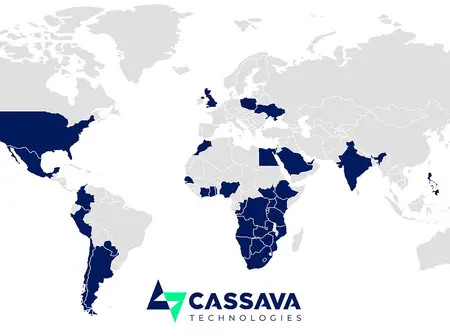Cassava Technologies has cast its lot with Accenture in a partnership that promises to deliver “sovereign AI” across Africa. The pitch is straightforward: combine Cassava’s GPU-as-a-Service housed in secure data centres with Accenture’s AI Refinery platform, all accelerated by Nvidia hardware, and you get a continent-wide solution that keeps data — and control — inside national borders.
South Africa is the launchpad, with Egypt, Kenya, Morocco, and Nigeria slated for expansion. On paper, it’s a clean fit: Cassava brings the infrastructure, Accenture the enterprise AI expertise. But scratch beneath the surface, and the move signals a bigger ambition. This isn’t just about data storage. It’s about who sets the terms of Africa’s AI future.
Cassava’s pan-African fibre backbone and interconnected data centres form the bedrock of this strategy. By layering AI capabilities onto that network, the company positions itself not merely as a bandwidth provider but as the continent’s AI landlord. The GPUaaS model makes sense in markets where few enterprises can afford to own or maintain the latest Nvidia-powered infrastructure.
But infrastructure is only part of the story. The partnership will be judged on whether it can translate computing power into real-world applications: agricultural forecasting in Kenya, fraud detection in Nigeria, or mineral exploration tools in South Africa. If those verticals don’t take off, the data centres risk becoming expensive showpieces rather than engines of growth.
Cassava and Accenture frame their partnership as a win for sovereignty and innovation, but the deeper story is about leverage. Whoever controls Africa’s AI infrastructure will shape not just data storage, but decision-making in finance, health, agriculture, and even governance. By planting its flag early, Cassava is positioning itself as the gatekeeper — a move that could either democratize access or centralize it under one dominant player.
The “crossroads” isn’t just technological. It’s regulatory, cultural, and geopolitical. South Africa may embrace sovereign AI to safeguard local industries, while Nigeria could weigh the benefits of cheaper global cloud platforms. Morocco and Egypt, with their strategic ties to Europe and the Gulf, may approach compliance differently altogether. Each market has its own politics, and Cassava’s ability to tailor services beyond the one-size-fits-all model will be decisive.
Then comes the trust factor. Localizing data sounds reassuring, but it also raises questions about who holds the keys to those servers. Will governments demand deeper access in the name of sovereignty? Will enterprises worry about surveillance risks replacing foreign dependency with domestic oversight? Cassava’s rhetoric of “secure, scalable, compliant” infrastructure will be tested the moment real-world trade-offs arrive.
At this juncture, the bet is as much about narrative as it is about GPUs and fibre networks. If Cassava can persuade African enterprises and policymakers that sovereign AI is more than a buzzword — that it’s a viable guardrail against digital colonialism — then the partnership with Accenture could become the playbook others rush to replicate. If not, the continent may find itself back at the mercy of global hyperscalers, only a few years older and none the wiser.
Even with infrastructure in place, people remain the bottleneck. Africa’s AI talent pool is growing, but not nearly fast enough to meet the surge in demand. Local universities are producing skilled graduates, yet many are lured abroad by higher pay and better research opportunities.
Cassava may end up relying heavily on imported expertise in the short term — Accenture’s global bench makes that possible — but that path risks reinforcing the same dependency sovereign AI claims to resist. Unless serious investment is directed into local skills pipelines, sovereign control could be sovereignty in name only.
Beneath the technical talk lies a complex geopolitical tug-of-war. Washington is pushing African states to align with U.S. cloud standards, Beijing has invested heavily in digital infrastructure, and Europe continues exporting its own regulatory frameworks. Cassava positions its model as African-led, yet true neutrality in this landscape may be elusive.
Partnering with Accenture, a U.S.-based firm, and relying on Nvidia chips adds layers of foreign influence. The critical question remains whether “sovereign” infrastructure built on external platforms can genuinely deliver local control.
The Cassava–Accenture strategy is ambitious, but the challenges are already visible. Cost is a major hurdle. Enterprise-grade platforms could push smaller African firms back toward Amazon or Microsoft — the very providers sovereignty is meant to bypass. Tiered, affordable offerings will be crucial to prevent adoption from stalling.
Talent remains another bottleneck. African universities are producing AI researchers, but supply lags behind demand. In the short term, Cassava may rely on foreign experts while scaling local training, raising the question of whether domestic capacity can catch up fast enough to avoid a new cycle of dependence.
Geopolitical pressures compound the challenge. With competing standards and investments from the U.S., China, and Europe, Cassava’s promise of African-led sovereignty will be tested against external influence and resource constraints.
Ownership and governance add another layer of complexity. Infrastructure built with foreign financing often comes with strings attached. Without strong safeguards, “sovereignty” could amount to managed autonomy under outside terms.
Ultimately, the future of sovereign AI in Africa hinges less on strategy documents and more on how these difficult questions are addressed in practice.
Cassava Technologies’ sovereign AI push is bold, and with Accenture at its side, it carries technical and commercial weight. But the project’s long-term impact will hinge on choices that aren’t just about servers or fibre cables. Cost structures, talent development, regulatory alignment, and above all, governance will determine whether sovereign AI becomes Africa’s digital guardrail or another grand vision that buckled under the weight of geopolitics and market realities.
For now, Africa stands at a crossroads — and Cassava’s big bet may decide which path is taken.

Leave a Reply